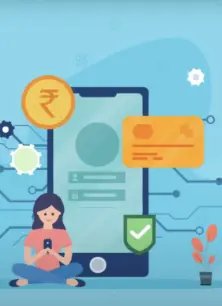 IST,
IST,
भारतीय रिज़र्व बैंक प्रथम वैश्विक हैकथॉन


परिचय
हैकथॉन एक ऐसा कार्यक्रम है जो समस्या विवरणों के माध्यम से विनिर्दिष्ट क्षेत्र में मौजूदा चुनौतियों के लिए नवोन्मेषी समाधानों के विकास हेतु लोगों और संस्थाओं को एक साथ लाने के लिए आयोजित किया जाता है। हैकथॉन की सीमित अवधि के दौरान समस्या विवरणों पर प्रतिभागियों द्वारा काम किया जाता है, जिनमें हार्डवेयर/सॉफ्टवेयर और कोडिंग समुदाय के व्यक्ति, दल, संस्थाएं शामिल हैं। तथापि प्रतिभागी इन्हीं तक सीमित नहीं हैं। हैकथॉन की कार्य-प्रणाली एक प्रतिस्पर्धी कार्यक्रम है जहां प्रतिभागी विचार प्रस्तुत करते हैं, समाधान तैयार करते हैं, आदिप्ररूप (प्रोटोटाइप) प्रदर्शित करते हैं। एक विशिष्ट पैनल द्वारा समाधानों का मूल्यांकन कर, हैकथॉन के विजेता/ विजेताओं का चयन किया जाता है। ये समाधान मुख्य रूप से प्रौद्योगिकी संचालित एवं नवोन्मेषी होते हैं जिन्हें मौजूदा प्रक्रियाओं को परिष्कृत करने के लिए आयोजकों द्वारा उपयोग में लाया जा सकता है या बढ़ावा दिया जा सकता है।
Event archive (year-wise):
- 2024
- 2023
- 2021
हारबिंजर 2024 के बारे में
हारबिंजर के दो संस्करणों के सफल आयोजन के साथ, भारतीय रिज़र्व बैंक वैश्विक हैकाथॉन के अगले संस्करण - ' हारबिंजर 2024 - परिवर्तन के लिए नवोन्मेष' का समय आ गया है, जिसमें नए विषय और नए समस्या-विवरण शामिल होंगे। फिनटेक में भारत की यात्रा, डिजिटल वित्त परिदृश्य में ज़िम्मेदार नवोन्मेष, समावेशिता, विश्वास और आत्मविश्वास के प्रति प्रतिबद्धता को रेखांकित करती है। वित्त के डिजिटलीकरण ने तात्कालिक निपटान के साथ भुगतान परिदृश्य को बदल दिया है, जिससे सुविधा और दक्षता बढ़ी है। वित्तीय क्षेत्र को धोखाधड़ी गतिविधियों से बचाने के लिए सतत रूप से महत्वपूर्ण प्रयास जारी हैं। इनमें से कुछ में, धोखाधड़ी का पता लगाने के लिए विनियामक सैंडबॉक्स में समर्पित कोहोर्ट की स्थापना करके धोखाधड़ी को कम करने के लिए नवोन्मेष को बढ़ावा देना शामिल है, जिसके तहत अभिनव उत्पादों का परीक्षण किया जाता है, तथा "आरबीआई कहता है", ई-बात कार्यक्रम आदि जैसे जन जागरूकता अभियानों के माध्यम से साइबर खतरों के जोखिमों को उजागर किया जाता है। हारबिंजर के पहले संस्करण के समस्या कथनों में से एक "डिजिटल भुगतान धोखाधड़ी और व्यवधान का पता लगाने के लिए सोशल मीडिया विश्लेषण निगरानी उपकरण" था। संस्थाएं विभिन्न प्रकार की धोखाधड़ी का पता लगाने और उन पर अंकुश लगाने के लिए विभिन्न तकनीकों का भी उपयोग करती हैं। हालाँकि, तकनीक के प्रयोग से नए प्रकार की धोखाधड़ी की संभावना में भी वृद्धि देखी गई है, जिसमें धोखेबाजों द्वारा ग्राहकों को लक्षित करने के लिए परिष्कृत तकनीकों का उपयोग किया जा रहा हैं। इसलिए, चुनौतियों का प्रभावी ढंग से समाधान करना और संदिग्ध व्यवहार का तुरंत पता लगाकर और धोखाधड़ी के प्रयासों का प्रभावी ढंग से मुकाबला करके धोखाधड़ी की गतिविधियों को रोकना महत्वपूर्ण है।
दृष्टिबाधित लोगों को वित्तीय सेवाएँ प्राप्त करने में चुनौतियों का सामना करना पड़ता है और वे समाज के सबसे कमज़ोर समूहों में से एक हैं। भारतीय रिज़र्व बैंक ने डिजिटल वित्त के क्षेत्र में 'दिव्यांगों' के लिए समावेशिता को प्राथमिकता दी है, सुगम्यता मानकों को अनिवार्य बनाया है और सहायक प्रौद्योगिकी विकास को बढ़ावा दिया है जिससे इस वर्ग को वित्त तक समान पहुँच को बढ़ावा मिल सके इस संबंध में अन्य पहलों में "ब्रेल कीपैड युक्त बोलने वाले एटीएम" और "बैंक परिसरों में दिव्यांग व्यक्तियों के लिए विशिष्ट उपयुक्त बुनियादी अवसंरचना आवश्यकताएँ" शामिल हैं। इसके अतिरिक्त, हारबिंजर के दूसरे संस्करण का एक समस्या-कथन "दिव्यांगों के लिए अभिनव, उपयोग में आसान, डिजिटल बैंकिंग सेवाएँ" था। वित्तीय सेवाओं को "दिव्यांगों के अनुकूल" बनाने के लिए, प्रौद्योगिकी का लाभ उठाकर डिज़ाइन में समावेशिता को बढ़ावा देने की आवश्यकता है।
इन क्षेत्रों में नवोन्मेष और अभिनव विचारों को प्रोत्साहित करने के लिए, भारतीय रिज़र्व बैंक अपना तीसरा वैश्विक हैकथॉन - हारबिंजर 2024 आयोजित कर रहा है, जिसमें दो विषयों के अंतर्गत चार समस्या कथन शामिल होंगे। हारबिंजर 2024 आपके नवीन विचारों को आमंत्रित करता है, जिनका विवरण निम्नलिखित है:
समस्या विवरण:
विषय-वस्तु 1: "शून्य वित्तीय धोखाधड़ी"
तात्कालिक भुगतानों के बढ़ने से सोशल इंजीनियरिंग धोखाधड़ी में वृद्धि हुई है, जिसके तहत जालसाजी कर पीड़ितों को धोखाधड़ी वाले खातों में पैसा भेजने के लिए धोखा देते हैं। इन लेनदेन के त्वरित निपटान को देखते हुए, हस्तांतरित धन को पुनः प्राप्त करना एक कठिन चुनौती प्रस्तुत करता है। इसके अतिरिक्त, पारंपरिक डेटा स्रोत, जैसे क्रेडिट रिपोर्ट और लेनदेन इतिहास, मूल्यवान होते हुए भी, उपभोक्ता व्यवहार पर एक सीमित परिपेक्ष्य प्रदान करते हैं। ऐसी धोखाधड़ी को रोकने और वित्तीय नुकसान को कम करने के लिए तत्काल हस्तक्षेप महत्वपूर्ण है। धोखाधड़ी वाले लेनदेन का शीघ्र पता लगाना और रिपोर्ट करना आवश्यक है, क्योंकि तनिक भी विलंब से धोखाधड़ी की गयी रकम की वसूली की संभावना काफी कम हो जाती है। वैकल्पिक डेटा स्रोतों के मदद से से धोखाधड़ी गतिविधियों की पहचान करने और उन्हें कम करने के लिए एक परिष्कृत दृष्टिकोण प्रदान करता है, साथ ही साथ उपयोगकर्ताओं के व्यवहार, जीवनशैली और वित्तीय स्थिति के बारे में गहन अंतर्दृष्टि प्रदान करता है।
प्रतिभागियों को ऐसे समाधान विकसित करने के लिए प्रोत्साहित किया जाता है जो एआई/एमएल, एपीआई, डेटा एनालिटिक्स और अन्य अत्याधुनिक तकनीकों का उपयोग करके तात्कालिक रूप से धोखाधड़ी का पता लगाने और रोकथाम करने में सहायता प्रदान कर सकते हैं। इन प्रणालियों को न केवल धोखाधड़ी गतिविधियों की सटीक पहचान करनी चाहिए, बल्कि व्यवहारिक, बायोमेट्रिक और सोशल मीडिया डेटा जैसे विभिन्न डेटा स्रोतों का उपयोग करके झूठी सकारात्मकता को कम करना चाहिए, धोखाधड़ी की शीघ्र रिपोर्ट करना और उसे रोकना चाहिए, जिससे धोखाधड़ी की गयी रकम की वसूली की संभावनाएँ बढ़ सकें।इसके अतिरिक्त, प्रतिभागियों को वैकल्पिक डेटा स्रोतों को इकट्ठा करने के लिए अभिनव तकनीकों का उपयोग करने के लिए प्रोत्साहित किया जाता है, जिससे सार्वजनिक डोमेन में उपलब्ध जानकारी का अभिनव उपयोग धोखाधड़ी वाले लेनदेन की भविष्यवाणी करने और पारंपरिक डेटा स्रोतों द्वारा अनदेखी की गई संभावित लाल झंडियों की पहचान करने में सक्षम हो सके।
डिजिटल लेनदेन की सुरक्षा सुनिश्चित करने के साथ-साथ, सिस्टम में जनता का विश्वास उत्पन्न करने के लिए उपयोगकर्ताओं की गोपनीयता की रक्षा करना भी अनिवार्य है। इस संबंध में, उपयोगकर्ता की पहचान स्थापित करने तथा साथ ही गोपनीयता के हनन को रोकने के मध्य संतुलन सुनिश्चित करने के लिए सतर्क दृष्टिकोण अपनाने की आवश्यकता है, विशेष रूप से लेनदेन विवरण के संबंध में। प्रतिभागियों को नए तकनीकी समाधान विकसित करने के लिए आमंत्रित किया जाता है जो लेनदेन सत्यापन तंत्र, सिस्टम अखंडता, धोखाधड़ी रोकथाम उपायों और रिपोर्टिंग आवश्यकताओं से समझौता किए बिना सीबीडीसी जैसे डिजिटल टोकन की मजबूत गोपनीयता प्रदान करसके । यह समाधान गुमनामी की सुरक्षा के लिए नवीन तरीकों का उपयोग करते हुये ऐसी सुविधाएँ करे जो एक सीमा के भीतर गुमनामी की अनुमति देती हैं। सीमा से बाहर, यह समाधान, लागू एएमएल/सीएफ़टी दिशानिर्देशों के अनुपालन को सुगम बनाए। समाधानों को अनिवार्य रूप से भारत के विनियमित रूपरेखा के भीतर जारी किए जा रहे डिजिटल टोकन के उपयोग के मामले को पूरा करना चाहिए।
म्यूल खातों (Mule Account) का उपयोग अक्सर धन शोधन और धोखाधड़ी जैसी अवैध गतिविधियों के लिए किया जाता है। साइबर धोखाधड़ी के मामलों में, चुराए गए धन को अक्सर निकाले जाने से पहले कई खातों से होकर गुज़ारा जाता है। धोखेबाजों द्वारा पीड़ितों को उनके बैंक खाते के माध्यम से चोरी/अवैध धन को वैध बनाने के लिए धोखा दिया जाता है और वे अनजाने में आपराधिक गतिविधियों के पात्र बन जाते हैं। अगर उनके बैंक खाते बंद या फ़्रीज़ कर दिए जाते हैं, तो उन्हें आर्थिक नुकसान भी होता है। कानून प्रवर्तन एजेंसियों और बैंकों/भुगतान प्रणाली संचालकों के लिए त्वरित कार्रवाई करना और लेन-देन के विभिन्न चरणों का पता लगाना चुनौतीपूर्ण होता है। म्यूल खातों की पहचान के लिए उभरती तकनीकों का उपयोग करके समाधान विकसित किए जा सकते हैं जो लेन-देन श्रृंखला का पता लगा सकते हैं और अलर्ट जारी कर सकते हैं ताकि ज़रूरत पड़ने पर धन को ब्लॉक/पुनर्प्राप्त किया जा सके। समाधान लेन-देन के पैटर्न का विश्लेषण भी कर सके और , म्यूल खातों से जुड़ी संदिग्ध गतिविधियों का पता भी लगा सके , लेन-देन व्यवहार में विसंगतियों की पहचान कर सके और आगे की जाँच के लिए धन शोधन या धोखाधड़ी के संभावित मामलों को चिह्नित भी कर सके ।
विषय-वस्तु: "दिव्यांगों के लिए अनुकूल"
दृष्टिबाधित व्यक्तियों के लिए मुद्रा नोटों की पहचान करना एक बड़ी चुनौती हो सकती है। इसका उद्देश्य पूर्ण या आंशिक रूप से दृष्टिबाधित व्यक्तियों को प्रचलन में मौजूद विभिन्न मूल्यवर्ग के भारतीय बैंक नोटों की सटीक पहचान और उनके बीच अंतर करने में सहायता करने हेतु तकनीकी समाधान खोजना और उनका निर्माण करना है, जिससे वित्तीय परिदृश्य में उनकी अधिक समावेशिता सुनिश्चित हो सके। प्रतिभागियों से अपेक्षा की जाती है कि वे ऐसे अभिनव, सुलभ, सुरक्षित, लागत-प्रभावी, उपयोगकर्ता-अनुकूल और अनुकूलनीय उपकरण/समाधान डिज़ाइन और विकसित करें जो इस उद्देश्य के लिए कंप्यूटर विज़न, मशीन लर्निंग, ऑप्टिकल कैरेक्टर रिकग्निशन (ओसीआर), हैप्टिक्स या पहनने योग्य उपकरणों आदि जैसी तकनीकों का उपयोग करते हैं। ये समाधान बाजार में उपलब्ध मौजूदा सुविधाओं में सुधार वाले होने चाहिए और दृष्टिबाधित व्यक्तियों को अपने दैनिक जीवन में मुद्रा नोटों की स्वतंत्र रूप से पहचान और प्रबंधन करने में सक्षम बनाने चाहिए। यह ध्यान देने योग्य है कि बैंक नोटों के किसी भी डिज़ाइन या सुरक्षा सुविधाओं (दृश्यमान या अदृश्य) में बदलाव के प्रस्ताव स्वीकार नहीं किए जाएँगे।
आवेदन कहाँ करें?
हैकथॉन हारबिंजर 2024 भारतीय रिज़र्व बैंक के स्वामित्व का है और यह भारतीय रिज़र्व बैंक द्वारा ही प्रायोजित किया गया है। इसे एप्लिकेशन प्रोग्रामिंग इंटरफेस एक्सचेंज (APIX) प्लेटफॉर्म पर होस्ट किया गया है। प्रतिभागी हैकाथॉन के लिए पंजीकरण करने और पंजीकरण के बाद प्रस्ताव जमा करने के लिए निम्नलिखित लिंक पर क्लिक कर सकते हैं।
https://app.apixplatform.com/h1/harbinger2024
यह आवेदन केवल ऑनलाइन प्रक्रिया के माध्यम से स्वीकार किए जाएँगे। भारतीय रिज़र्व बैंक हारबिंजर के आगे के चरणों के लिए सबसे आशाजनक समाधानों को चयनित करेगा।
आवेदन हेतु पात्रता ?
सभी संस्थाएँ, टीमें या व्यक्ति (अठारह वर्ष और उससे अधिक आयु के) जो संविदात्मक समझौते में प्रवेश करने के पात्र हैं, आवेदन करने के पात्र हैं। इसके अतिरिक्त, उत्पाद/समाधान में नवोन्मेष या सर्वहितकारी प्रौद्योगिकी के नवीन अनुप्रयोग का तत्व होना चाहिए।
सभी पृष्ठभूमि और भौगोलिक क्षेत्रों के प्रतिभागियों का स्वागत है, हालाँकि भारतीय वित्तीय सेवा बाजार और उपभोक्ताओं के बारे में जानकारी रखने वाले प्रतिभागियों को प्राथमिकता दी जाएगी।
आवेदन कैसे करें?
कृपया पंजीकरण के लिए लिंक पर क्लिक करें।
https://app.apixplatform.com/h1/harbinger2024
पंजीकरण के पश्चात, कृपया समस्या विवरण चुनें और प्लेटफ़ॉर्म पर अपना प्रस्ताव सबमिट करें। कृपया प्रस्ताव से संबंधित सभी प्रश्नों के उत्तर भरें।
यदि आप प्रत्येक श्रेणी में निर्धारित सभी मानदंडों को पूरा करते हैं, तो आप एक से अधिक समस्या विवरण के लिए आवेदन कर सकते हैं। आपका समाधान एक से अधिक समस्या विवरण द्वारा कवर की गई आवश्यकताओं को पूरा करने का लक्ष्य रख सकता है। हम वांछित लक्ष्य को प्राप्त करने के लिए प्रस्ताव की विशिष्टता और व्यवसाय मॉडल की व्यवहार्यता पर विचार कर रहे हैं।
आवेदन केवल दिए गए लिंक के माध्यम से ही स्वीकार किए जाएँगे। हारबिंजर 2024 चार चरणों में आयोजित किया जाएगा जिसमें प्रविष्टियों की छंटनी (फेज़ I), समाधान विकास के लिए प्रविष्टियों को चयनित करना (फेज़ II), समाधान विकास (फेज़ III) और विजेताओं का मूल्यांकन और चयन (फेज़ IV) शामिल हैं। भारतीय रिज़र्व बैंक फाइनल के लिए सबसे आशाजनक समाधानों को चयनित करेगा। चयनित की गई संस्थाओं को एक कार्यशील समाधान प्रस्तुत करना होगा जिसका मूल्यांकन विजेताओं के चयन के लिए किया जाएगा। विजेताओं का चयन कुछ मूल्यांकन मानदंडों के आधार पर किया जाएगा, जिनमें समस्या की समझ, नवोन्मेष, समाधान की व्यापकता, कार्यान्वयन में सुलभता, प्रदर्शन/उपयोगकर्ता अनुभव आदि शामिल हैं।
प्रमुख तिथियाँ:
पंजीकरण और प्रस्ताव प्रस्तुत करना
प्रारंभ: जून 07, 2024
समाप्त: जुलाई 19, 2024
पुरस्कार:
1. प्रत्येक श्रेणी के समस्या विवरण के विजेताओं को 40 लाख रुपये की पुरस्कार राशि प्रदान की जाएगी ।
2. विशेष पुरस्कार: सभी चार समस्या विवरणों में सर्वश्रेष्ठ 'महिला टीम' को 20 लाख रुपये की पुरस्कार राशि प्रदान की जाएगी ।
3. प्रोत्साहन राशि: प्रोटोटाइप के विकास की लागत को पूरा करने के लिए समाधान विकास (फेज़ III) के लिए चयनित की गई टीमों को 5 लाख रुपये की पुरस्कार राशि प्रदान की जाएगी ।
संपर्क करें:
हारबिंजर 2024 से संबंधित प्रश्नों के लिए, कृपया
पंजीकरण या प्रस्ताव प्रस्तुत करने की प्रक्रिया के दौरान तकनीकी प्रश्नों के लिए, कृपया निम्नलिखित मेल पर संपर्क करें:
Media

HACKATHON RESULTS

HARBINGER 2021












